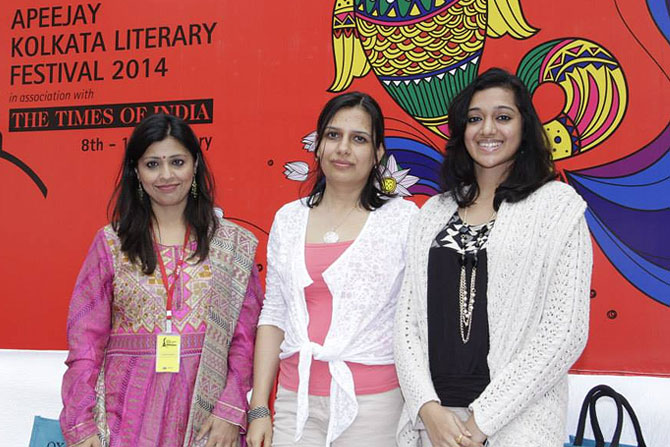
Amrita Chowdhury, country head and publishing director, Harlequin India talks about Mills & Boon's Indian flavour, GenY and their idea of romance and the future of romantic novels in India.
For more than a century, Mills & Boon has been to fans of romantic fiction what Beatles have been to lovers of English rock.
M&B, fondly termed the 'Bible of Lovers', has always managed to strike the right chord with its readers across the globe.
Having set foot in India a few years back -- packaged and modified subtly to cater to its readers in this country -- Mills & Boon publisher Harlequin has many plans on the anvil, said Amrita Chowdhury, country head and publishing director of Harlequin India.
Chowdhury visited Kolkata to take part in the recently concluded Apeejay Kolkata Literary Festival.
Curated by the city-based Ahava Communications, Chowdhury shared the dais with author Shoma Narayanan and model and actress Moubani Sorcar in an open session titled 'Happily Ever After? Romance Writing Today'.
Soon after the event, Chowdhury spoke to rediff.com's Indrani Roy about the past, present and future of romantic novels in India, Mills & Boon's long ride, a transformation in readers' mindset among many other issues.
Excerpts:
You took a very long route to enter the publishing industry -- you used to head the education portfolio at Harvard Business School. . .
(Smiles) It has been a scintillating transit for me.
I was a strategy consultant with a keen penchant for publishing.
To run the show at Harlequin India, I learnt to blend my skill with my passion.
And the experience has been overwhelming so far.
As you mentioned at the open session, the Gen Y's idea of romance has changed in recent times. . .
Of course! Youth these days are very tech-savvy and suave.
They don't really quote (William) Shakespeare or (John) Milton to proclaim their love for each other.
They would rather tweet, send a text message or leave a note on Facebook.
Their notion of love has led to the inception of a new genre altogether known as the 'chicklet romance'.
As a publishing house, we are aware of this change and are constantly realigning ourselves to keep pace with the changing times.
What exactly do you mean by realignment?
We are bringing in new authors, who are relatively young and dynamic, who can feel the readers' pulse better.
The novels penned by them are designed appropriately so that the younger generation can relate to them.
We are religiously making efforts to make our titles indispensable for the young minds.
By this, do you suggest that your new heroines are smarter; they are career women unlike the delicate darlings we used to read about in old M&B series?
Yes, exactly.
The female characters that you come across in these new novels are not only well-groomed and self-motivated; they also have an undercurrent of feminism sprinkled over them.
The male characters (smiles), like before, are tall, dark and handsome on most occasions.
However, the love that ensues has both the protagonists on an equal footing.
It's a perfect match of two well-tuned souls.

What is your target group in India?
Both for Harlequin Romance and Mills & Boon, our target group consists of those in the age group of 18-25 .
Though our readers are predominantly women, it would be wrong to say that men don't read these books at all.
As one of the audience in the open session asked, do you plan to bring out romance in future that would have middle-aged protagonists?
Yes, we do see a huge demand for such stories.
I think as we grow old, love and passion are sacrificed at the altar of our daily chores.
Thereafter, one tends to take refuge in the world of fiction.
It's time we published novels meant for the older generation.
How is Harlequin faring in India?
Ours has been a fantastic voyage so far.
For five years, we have maintained a double-digit growth.
Mills & Boon is more than 100 years old. Published in 31 languages, it is sold in 111 countries.
It's a strong brand and we are strengthening it further.
In 2013, we launched the new series -- Mira, Harlequin Teen -- as well as the non-fiction.
In our constant endeavour to expand in India, we have lined up a number of Indian authors.
Has re-writing Harlequins with Indian heroes worked or do readers still prefer fair-skinned heroes?
Mills & Boon has always had a huge pull in India.
But now that we have introduced desi protagonists, they are being accepted pretty well by the readers.
Books by Shoma Narayanan, Adite Banerjie, Tanu Jain are being lapped up by the readers here.
For instance, Secrets & Saris by Shoma that uses Delhi as the backdrop has received wide critical acclaim.
Do the present-day novels stress on sex? Are they more explicit by nature?
This is true only to an extent.
With time, Mills & Boon has evolved into love stories that are more passionate by nature.
But that doesn't mean it has become synonymous with soft-porn.
We do publish erotica and some of them do sell a lot.
Take the case of Fifty Shades of Grey by E L James.
The book, it is heard, accounted for almost 1 in 10 of the 750 million books Random House sold globally in print or online across the year.
But I think romance as a genre needs to strike a balance between two extremes.
It should neither be a sob story nor pornography.
Success of any romantic novel depends on how deftly we achieve this equilibrium.
India is still considered quite protective as far its notions on sex and love are concerned. Do you, therefore, have to edit the content of modern novels often?
Not really.
As I told you, we have roped in a number of Indian authors who can read the Indian minds.
Our content has been our main strength over the years.
Be it India or abroad, our editorial board screens each and every book that we publish so as to retain our position in the global market.
How popular has M&B been in regional languages?
Mills & Boon is now available in Hindi, Marathi, Malayalam and Tamil.
Each translated title is reviewed meticulously so that the original flavour doesn't get lost.
M&B in Tamil is published in a magazine format as romance in that state is most popular in that layout.
For the distribution of regional books, we have tied up with local partners for wider reach and viable business.
As the head of Harlequin in India, what have been your most important lessons?
I have learnt to adjust to the needs of the market.
My experience in Harlequin India taught me to mould my strategies regularly according to situation.
I have been travelling through a series of experiments -- some have selves and believe in love and romance.
They should be self-reliant and confident and should always understand the worth of respect.